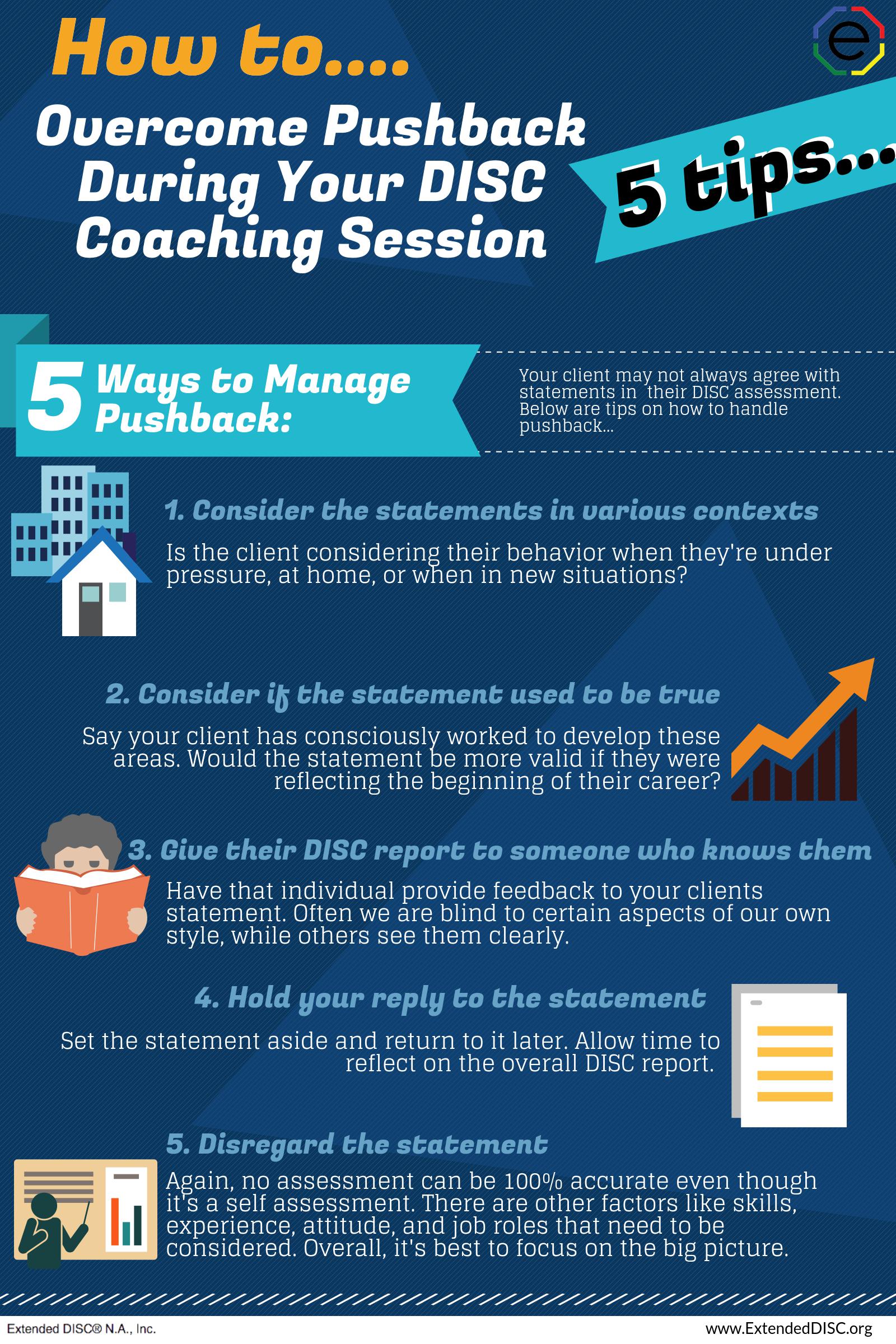Have you ever watched your clients reviewing their results during a DISC coaching session? You'll likely see them nodding their heads, as if in agreement with results. Suddenly, they stop reading.
As coaches and managers, you may encounter clients who disagree with a certain section of their DISC reports. What's the best way to manage pushback during a DISC coaching session? How can you constructively respond and move the client forward?

Be Proactive: Prepare for Your DISC Coaching Session.
The key to an effective coaching session is to be prepared. Results of the DISC Assessment are the focus of the DISC coaching session. First, you must get to really know the DISC tool. However, you can then consider using parts of the DISC report to your own advantage. If you plan and prepare for your DISC coaching session, there is less chance of encountering pushback. Even if pushback occurs, you will still be ready!
Consider Your Own DISC Style
First, consider the DISC styles of your clients from your own view. Once you've identified the DISC profile of your client, you may need to adjust your own DISC style. Do you need to work on building trust with your S-style client? Do you need to focus on clear action-oriented goals for your D-style client?
There will be times when your coaching is not getting the desired results. Focus on your own DISC style. If your DISC style doesn't match up with your client's DISC style, did you make any adjustments? Make sure you're not the roadblock to difficult DISC coaching sessions. Remember, we are the only ones who can control our behaviors.
It is our job as coaches to see if any adjustments need to be made in order to create a smoother interaction. We will be better prepared if we remind ourselves before each coaching session to adjust our own behavior.
Set the Stage for an Effective DISC Coaching Session

Your client is reading the section describing their most natural preferred way of doing things. Often times, they don't grasp the descriptor words are describing typical behavior as seen by others. It may not be how they would describe their own behaviors. Hence, you may experience pushback or disagreement that a statement "doesn't describe them".
Remind your client to read the text as such and use it to develop an overall picture. When evaluating specific statements, it is important to consider their conscious ability to adapt their behavior to fit the needs of the specific situation. Also, it may not take into account what your client has learned to do outside of their natural style. The report may not recognize what clients believe themselves to be, since it is focuses on natural and spontaneous behavior. Let's say your client has always been the most decisive one where they grew up. However, when compared to all people, they would not be considered decisive.
Tips for Overcoming Pushback in a DISC Coaching Session
If your client disagrees with a statement in the DISC report, you can offer options for interpreting the results.
- Consider the statements in various contexts. For example, the client should consider their behavior under pressure, at home, and in new situations.
- Consider if the statement used to be true, but your client has consciously worked to develop these areas. Would the statement be more valid if reflecting beginning of your client's career?
- Give the DISC report to someone who knows him or her. Have them provide feedback on the statement. Often we are blind to certain aspects of our own style while others see them clearly
- Set the statement aside and return to it later. Allow time to reflect on the overall report.
- Disregard the statement. Again, no assessment can be 100 percent accurate even though it is a self-assessment. There are other factors like skills, experience, attitude, and job roles, which need to be considered. Overall, it is best to focus on the big picture.

Overall Goals for an Effective DISC Coaching Session

There are sections of the DISC assessment that help your client discover what motivates them. In addition, use the sections of the DISC report that help your client identify what may drain their energy. Don't overwhelm your client by addressing every motivator or de-motivator. Context is important. Jobs and work experience can play a factor in which items are currently relevant. You will less likely encounter pushback if you help your client focus on the items that create the most impactful results.
Nurture your client's confidence by focusing on the Strengths section of the DISC report. Who doesn't love reading about their strengths? In addition, reading about their strengths may help them better accept their development areas. It's hard a embrace one area of the report and refute another when it is all based on the client's natural style. It helps decrease pushback and keeps them focused on the big picture.
Slow down and be present. Your client is the only one that can accept their DISC results and decide to make behavioral changes. We need to listen to their reasons for disagreeing and coach them to reflect and identify areas they need to be more self-aware. They also need to feel empowered. They are the only ones who can truly make the changes.
DISC Assessment Resources for Coach's and Managers
We offer the 2017 updated Coach's Playbook to help your client reach sustainable behavior change; one that will improve their performance and daily lives. We've designed the Coach's Playbook to help you debrief the Individual Assessment with your client. However, it is also a good resource to deepen your own knowledge as a coach.
There is no rigid set of guidelines for delivering the perfect DISC coaching session. However, there are many tips, when matched to context a DISC coaching session, that can maximize benefits for the coach and client. Finally, reassess progress and move forward. Practice the above tips that work best for you and your client.
